36 Union Representatives Complete March 2025 DOLE UP Law Paralegal Training Program on Labor Rights and Remedies
Thirty-six (36) participants from the Cordillera Administrative Region, Regions I, II, and III completed the 3rd round of the Department of Labor and Employment (DOLE)–University of the Philippines (UP) College of Law Paralegal Training Program on Labor Rights and Remedies held in Sequoia Hotel, Timog Avenue corner Mother Ignacia Avenue, Quezon City, last 25-30 March 2025. Pursuant to the 23 August 2023 Memorandum of Agreement between the DOLE, UP College of Law, and UP Law Center, the training was a gender-sensitive paralegal program for workers, capacitating them with knowledge of various legal remedies available to them, as well as case build-up skills so that they can help provide relevant information and/or evidence to establish an airtight case against perpetrators of violence committed against their ranks. The six-day training was again conducted by the Bureau of Labor Relations (BLR), DOLE, and the UP Law Center Workers and Employees Program (WEP).
LECTURES
FIRST DAY: 25 MARCH 2025
The training began with a welcome from BLR DOLE Director Attorney Arturo Alfonso J. Herbosa. The next six days, he explained, would involve not only lectures but also case studies to equip them with legal awareness and practical skills. The primary goal was to empower participants to become CCTVs: to help themselves and others when human rights are being violated, prevent violations, and document evidence to hold violators accountable. An example given was encounters with the police, where an understanding of the law, how to handle situations with confidence, and knowing how to respond calmly would be crucial to prevent misunderstandings or harm.
Professor Patricia R.P. Salvador-Daway, WEP Founding Program Director, noted that a total of 75 participants had already finished the paralegal training program since 2024. Recalling the MOA, she added that the training would cover a wide array of relevant topics, and that the resource persons were chosen not only for their experience and academic achievements but also for their hearts being in the right place for the protection of labor rights.
With the current Labor Code about to reach 51 years old, Professor Daway highlighted the ongoing effort to pass a Revised Labor Code, which is the product of seven years of work by the UPLC. Although the proposed code has not yet undergone its first reading in Congress, it is hoped that it will be advanced in the 20th Congress.
The lectures delved into workers’ rights and protections under the law, fundamental legal principles grounded in social justice and human rights, and the role of civil law in regulating human interactions.
Rights of Workers
Attorney Jasper Frederick C. Briones, WEP Junior Legal Associate, discussed the rights of workers under Philippine labor laws. Focus was given to the fundamental International Labour Organization conventions and the cardinal rights of labor under Article XIII, Section 3 of the Constitution: self-organization, collective bargaining and negotiation, peaceful concerted activities including the right to strike in accordance with law, security of tenure, humane working conditions, living wage, and to participate in policy and decision-making processes. The discussion covered several protections for workers operationalizing these rights, such as labor standards, substantive and procedural due process, and protection from discrimination.
Fundamental Legal Principles
Attorney Arnold F. De Vera, WEP Program Director, discussed fundamental legal principles of labor law, especially social justice, equality, management prerogative, and its limitations. The duty of the State to respect, protect, and fulfill human rights was explained in light of various legal instruments, including the Constitution, statutes, and departmental issuances. Human rights also have their legal bases in customary international law, the Universal Declaration of Human Rights (UDHR) of 1948, the International Covenant on Civil and Political Rights (ICCPR), and the International Covenant on Economic, Social and Cultural Rights (ICESCR). This portion concluded with a discussion on the International Labour Organization.
Human Relations in Civil Law and Jurisprudence
Attorney Glenda T. Litong, Law Reform Specialist V of the UP Law Center—Institute of Human Rights and Head of the Training and Convention Division, explained key provisions in the Civil Code Chapter on Human Relations and doctrines from jurisprudence concerning interactions among people in maintaining social order. The types of civil remedies available, such as restitution, compensation, rehabilitation, satisfaction, and guarantees of non-repetition, as well as the various types of damages that may be awarded to the party who suffers, were explored.
SECOND DAY: 26 MARCH 2025
On 26 March 2025, the morning session focused on gender topics, while the afternoon session focused on remedies under labor law and criminal laws penalizing violations of human rights.
Examining Gender and Society
Assistant Professor Maritess D. Cruz of UP Diliman College of Social Work and Community Development and the UP Center for Women’s and Gender Studies illustrated the need to examine the relationship between gender and society. The aim was to understand gender sensitivity and identify gender-related labor issues, as well as the policies and international instruments that address them. Key gender issues at work were discriminatory hiring policies and practices, gender division of labor, gender pay gap, and gender violence.
Anti-Sexual Harassment and Safe Spaces in the Workplace
Attorney Louise Aubrey Mejia, Legal Associate of the UP College of Law—Gender Law and Policy Program (GLPP), outlined key statistics on sexual harassment in the world and in the Philippines and the challenges that victims face in telling their experiences, such as fear, lack of trust in authorities or community leaders, and unclear procedures. The lecture then covered the prohibited and mandatory acts under Republic Act No. 7877 (Anti-Sexual Harassment Act) and Republic Act No. 11313 (Safe Spaces Act).
Jurisdiction and Remedies in Philippine Labor Law and Jurisprudence
Attorney Juan Carlo P. Tejano of the Sentro ng Alternatibong Lingap Panlegal, Inc. (SALIGAN), discussed through a game the various types of labor disputes and the proper agency or venue for them. To save on time and costs, it was important to understand the Single Entry Approach (SENA) as well as the jurisdiction conferred upon the Labor Arbiter, Mediator-Arbiter, Bureau of Labor Relations (BLR), National Conciliation and Mediation Board (NCMB), DOLE Regional Director, and DOLE Secretary, the Court of Appeals, and the Supreme Court.
Violation of Rights as Crimes
Attorney Dan P. Calica, Lecturer at the UP College of Law and Managing Partner at Abellera and Calica Law Offices, comprehensively discussed the criminal justice system, focusing on Article III (Bill of Rights) of the Constitution as well as how violations of these rights were penalized under the Revised Penal Code provisions on crimes against the fundamental law of the state, illegal assemblies and associations, threats and coercion, and discovery and revelation of secrets. Also covered were special laws, namely Republic Act No. 9745 (Anti-Torture Act), Republic Act No. 10353 (Anti-Enforced or Involuntary Disappearance Act), and Republic Act No. 9851 (Philippine Act on Crimes Against International Humanitarian Law, Genocide, and Other Crimes Against Humanity).
THIRD DAY: 27 MARCH 2025
The morning session covered the Anti-Terrorism Act of 2020 and constitutional rights concerning arrest, search, detention, and remedies for human rights violations. The afternoon session focused on the Omnibus Guidelines on Freedom of Association and Civil Liberties.
Anti-Terrorism Act of 2020 and Related Issuances
Attorney Emir-Deogene V. Mendoza, WEP Senior Legal Associate, discussed Republic Act No. 11479 (Anti-Terrorism Act of 2020) and its related issuances. The lecture made clear that the exercise of civil and political rights does not constitute terrorism, that only the Anti-Terrorism Council may designate terrorists, and that only the Court of Appeals may proscribe terrorists under the law. The participants learned about terrorism and how it is different from ordinary crime by considering the scale and purpose. Also discussed were remedies under the Implementing Rules and Regulations and the Supreme Court’s A.M. No. 22-02-19-SC (Rules on the Anti-Terrorism Act of 2020 and Related Laws).
Arrest, Search, and Detention
Attorney Niel Anthony S. Borja, Lecturer at the UP College of Law, discussed the required rules to effect valid arrest, search, and detention under Article III (Bill of Rights) of the Constitution, the Rules of Court, and Supreme Court decisions. Remedies for violations were covered at the end.
Omnibus Guidelines on Freedom of Association and Civil Liberties
Attorney de Vera, WEP Program Director, dissected into bullet points for ease of reference the Omnibus Guidelines on Freedom of Association and Civil Liberties. Participants were guided as to the roles of various government agencies, such as DOLE, Department of Interior and Local Government (DILG) / Philippine National Police (PNP), Investment Promotion Agency (IPA), Department of National Defense (DND), Armed Forces of the Philippines (AFP), National Security Council (NSC), Department of Justice (DOJ), and National Task Force to End Local Communist Armed Conflict (NTF ELCAC), and the available remedies per agency.
FOURTH DAY: 28 MARCH 2025
The morning session was dedicated to access to legal assistance and the special writs as remedies for human rights violations, while the afternoon session shone a spotlight on the importance of gender-fair language for inclusivity and international and domestic legal remedies.
Access to Legal Assistance
On behalf of Attorney Marwil N. Llasos, Chief of Staff to the Dean, Deputy Director of the Office of Legal Aid, and WEP Member, Attorney Mendoza gave the lecture. The importance of the Public Attorney’s Office (PAO) as the public defender for all courts in the Philippines to provide the indigent sector with access to counsel in times of need and to implement the Constitutional guarantee of free access to courts, due process, and equal protection under the laws, was discussed. Also discussed were other venues for free legal aid and assistance, such as the Integrated Bar of the Philippines and the Unified Legal Aid Service (ULAS).
Special Proceedings: Writs of Habeas Corpus, Amparo, and Habeas Data
Also, on behalf of Attorney Llasos, Attorney Mendoza differentiated the writs of habeas corpus, amparo, and habeas data, in terms of when each writ is proper, who may file, where to file, requirements and content of the petition, what is covered by the writ, the circumstances under which each writ may be issued, and the person to whom each writ is directed.
Use of Gender-Fair Language for Inclusivity
Assistant Professor Irish Joy G. Deocampo of the UP Diliman Department of English and Comparative Literature and the UP Center for Women’s and Gender Studies illustrated the importance of gender-fair language to minimize the effects of sexist language, such as stereotyping. Several guidelines were then laid down for using language, which include replacing words and phrases with gender-neutral labels to reduce gender bias in both English and Filipino.
Overview of Legal Remedies
Attorney Mendoza of WEP summarized the domestic legal remedies through a game. Also introduced were the mechanisms under international law, such as the International Labour Organization (ILO) and international human rights mechanisms.
FIFTH DAY: 29 MARCH 2025
The last day was dedicated to practical topics relating to case buildup, namely evidence, investigation, and interview, and documentation of cases, such as report writing and affidavits. The last lecture explored how collective bargaining agreements can promote gender equality at work.
Introduction to Evidence
Attorney Briones of WEP discussed the importance of evidence and key principles related to admissibility, or the requirements for evidence to be considered in court in the first place. The topics covered were object, documentary, and testimonial evidence, burden of proof, burden of evidence, presumptions, presentation and offer of evidence, and the weight and sufficiency of the evidence.
Conducting Investigations and Interviews
Attorney Nathaniel N. Diaz, WEP Senior Legal Associate, illustrated do’s and don’t’s in conducting investigations and interviews and selecting participants, then demonstrated or simulated conducting an interview, while Attorney Diaz and the other participants pointed out how to improve rapport building, free narrative, questioning, and closure.
Documentation of Cases: Report Writing and Affidavit Making
Attorney Diaz also illustrated report writing, with the aim of coming up with a written account of events from witness testimony and gathered evidence, and affidavit making, where a person testifies about an event based on personal knowledge under oath. Participants also drafted their reports and affidavits and presented them for comment by Attorney Diaz and their co-participants.
Gender-based Collective Bargaining
Professor E. (Leo) D. Battad, WEP Member and GLPP Program Director, emphasized how both the process and the resulting agreement of collective bargaining can serve as a tool for promoting gender equality at work pending resolution of legislative gaps. Participants pointed out what portions of the sample CBA provisions were not gender-fair, and suggested ways to make them gender-fair.
CASE STUDIES
After six days of lectures, participants applied their knowledge regarding rights violated, remedies available, and evidence for case buildup. On the last day, 30 March 2025, presentations of the five groups analyzing documented incidents of violations of freedom of association were followed by follow-up questions, comments, and suggestions from BLR, represented by Director Herbosa and Mediator-Arbiters, and from WEP, namely, Attorney De Vera, Professor Battad, Attorney Briones, Attorney Diaz, and Attorney Mendoza.
CONCLUSION
DOLE Assistant Secretary Attorney Lennard Constantine C. Serrano thanked the UP College of Law, UP Law Center, WEP, and the resource persons for the successful week-long training. He congratulated the 36 participants for completing the challenging six-day program, which covered criminal, civil, labor, and procedural law, as well as paralegal skills—topics typically studied over several years in law school. While there were no graded recitations, activities kept everyone engaged. The participants were then encouraged to continue serving as voices for workers, to consider a career in law, and to act as advocates for workers’ rights.
BLR Director Herbosa, recalling his earlier remark on the role of the participants as CCTVs—watchdogs for labor rights, emphasized the importance of realizing their roles now that they are “full-fledged CCTVs.” Their role is to prevent unnecessary harassment, killings, and other forms of violating worker and trade union rights; to help in the right, appropriate, and relevant manner, in which case, knowledge of the law is crucial; and to face authorities with calm confidence, not arrogance. True confidence comes from knowledge, and not, as Director Herbosa stressed, from being loud or emotional. He likened paralegals to ambulance drivers and first aid, such that the patient would still be breathing when the doctor takes over. Finally, he encouraged continuous learning through accessible legal resources, urging participants not to stop after obtaining the training certificate, but rather to pursue education and advocacy.
Speaking on behalf of UP College of Law Dean Darlene Marie B. Berberabe, Attorney Llasos expressed deep gratitude to all who participated in and supported the paralegal training. He acknowledged that with the 36 new graduates of the training, a total of 111 participants from nine (9) regions have finished the program. It was emphasized that a dignified and decent life is only possible if labor rights are protected. The participants were encouraged to share what they had learned, strengthen unions, and uplift workers’ voices—all in the spirit of honor and excellence in service to Filipino workers.
Finally, WEP Program Director Attorney De Vera’s closing remarks was a call to action: everything that needs to be said or taught has already been covered, so now is the time to go forth and do good work for oneself, for one’s job, for the community, and to stand up for workers’ rights.
Two more rounds of the paralegal training program on labor rights and remedies are expected to be held in 2025.

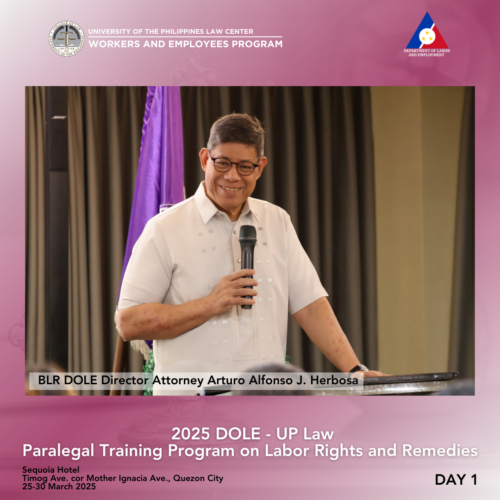
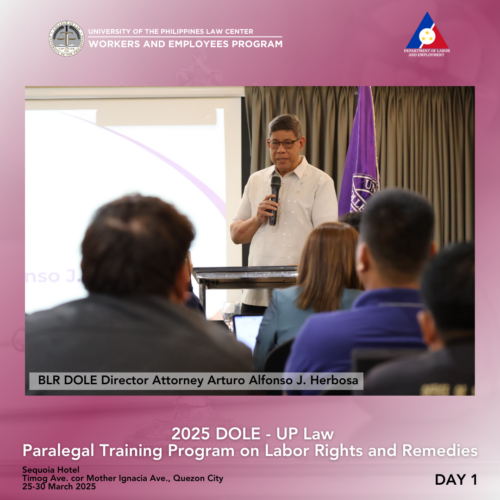
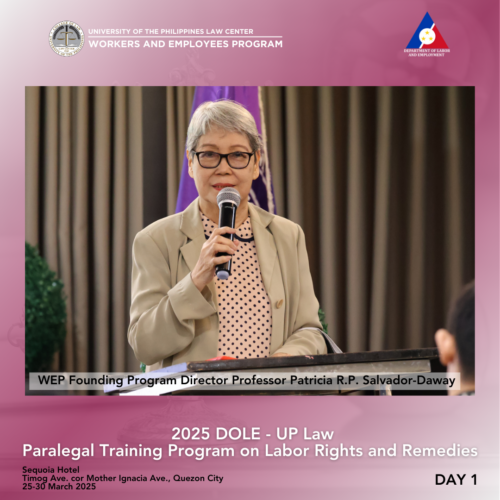
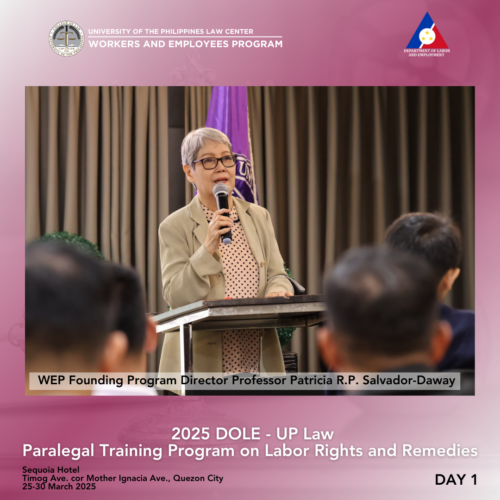
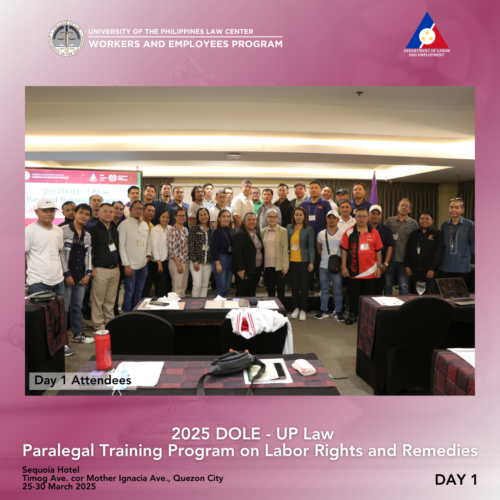
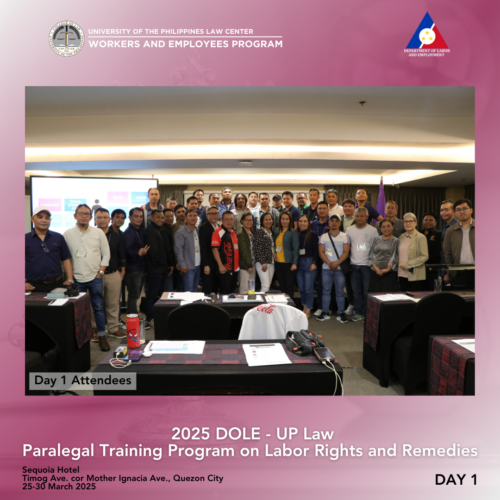
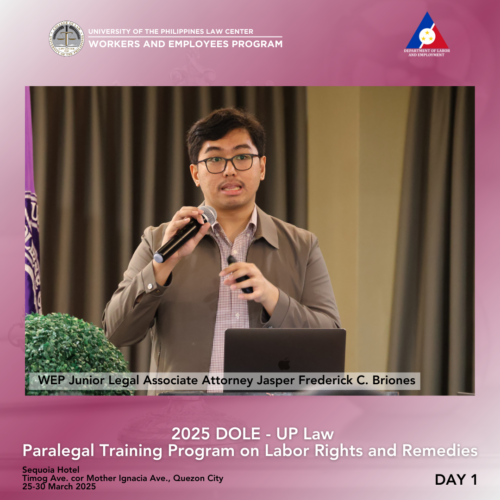
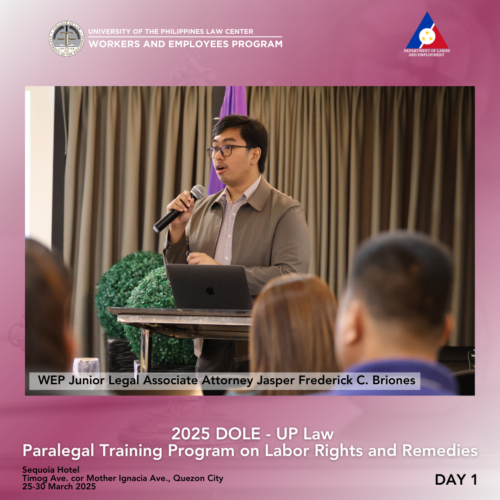
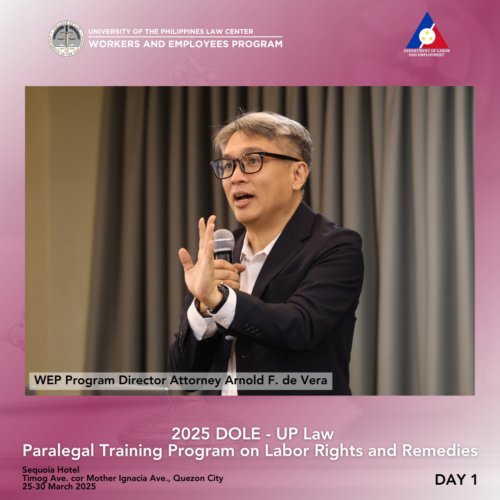
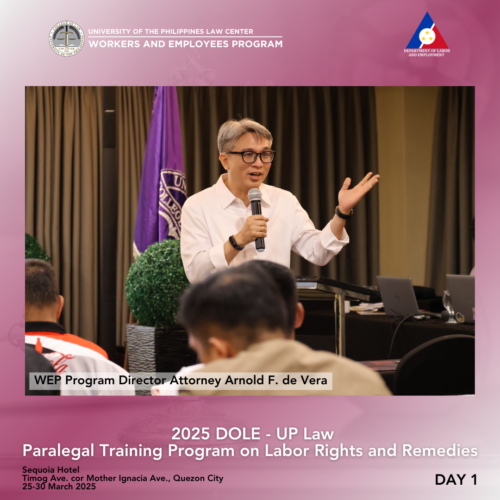
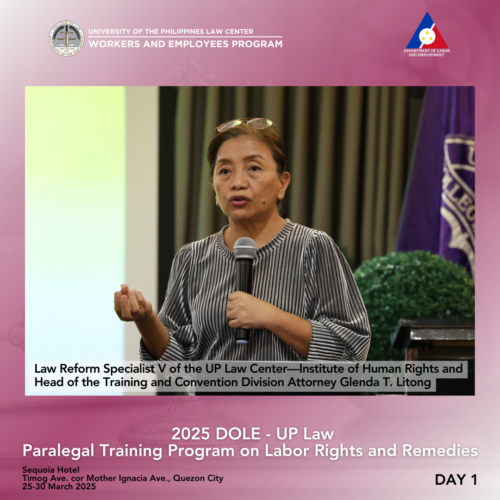
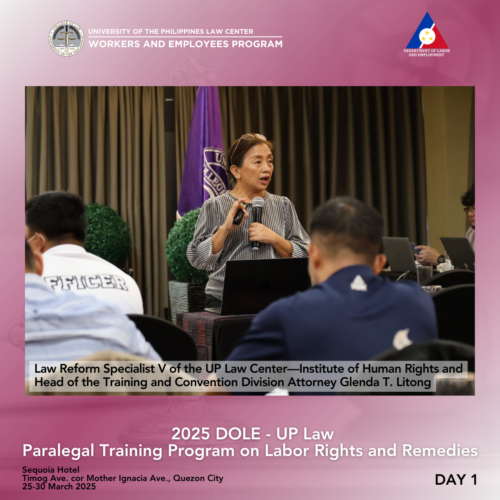
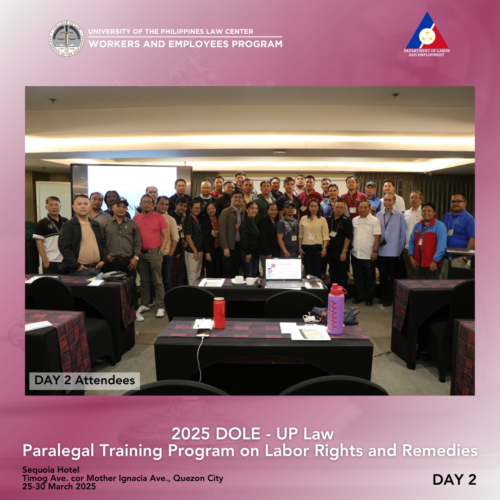
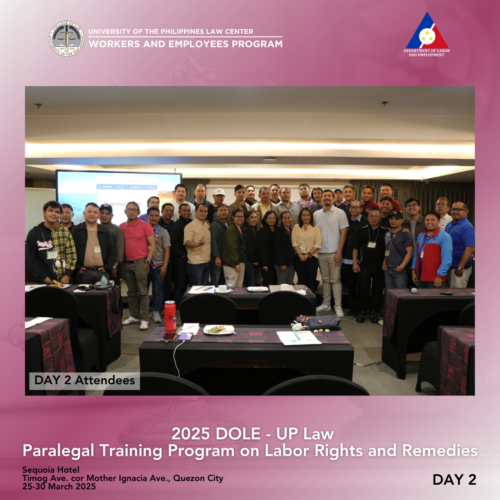
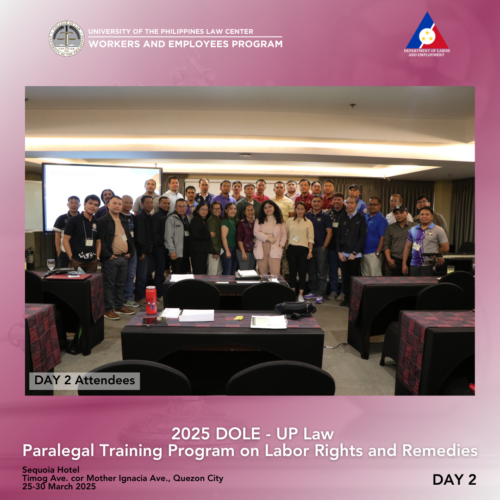
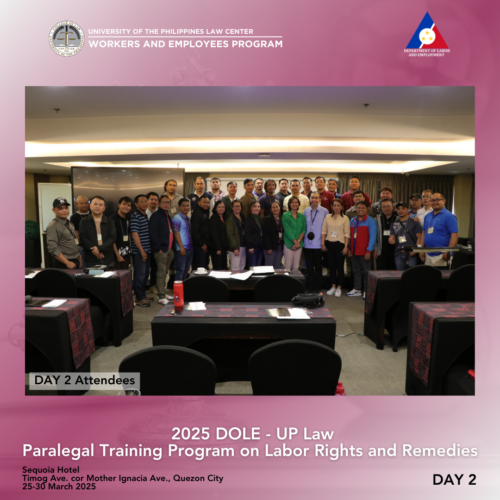
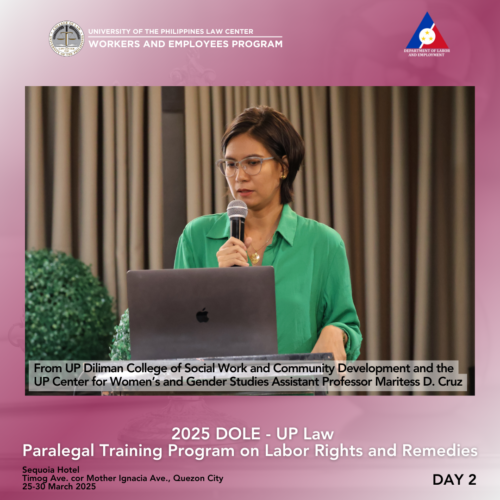
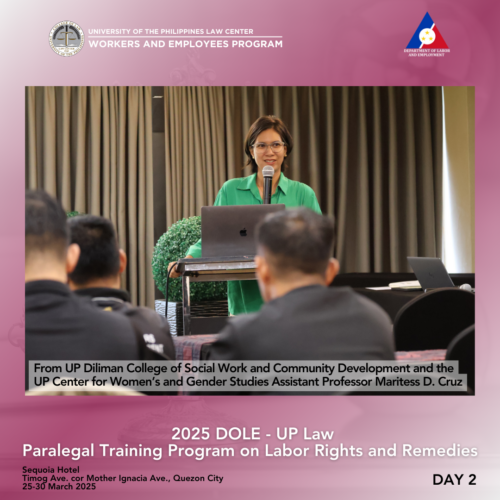
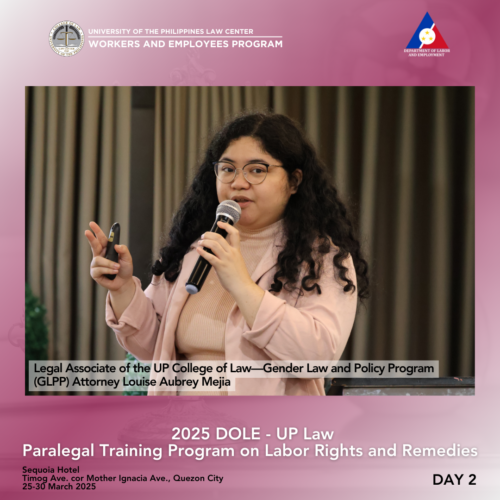
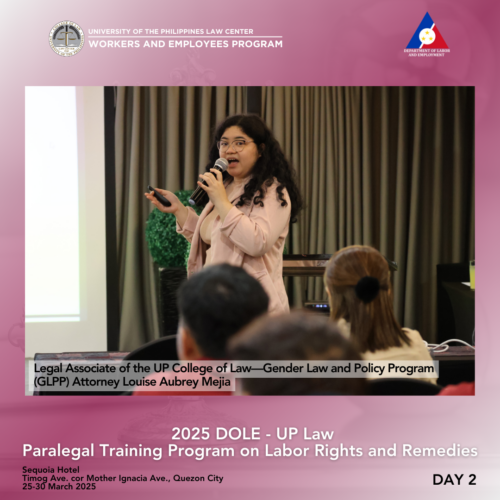
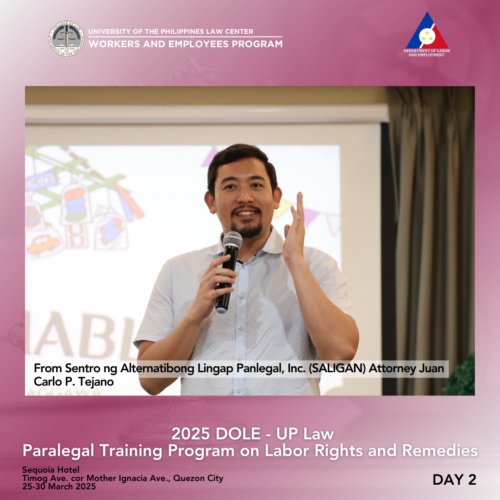
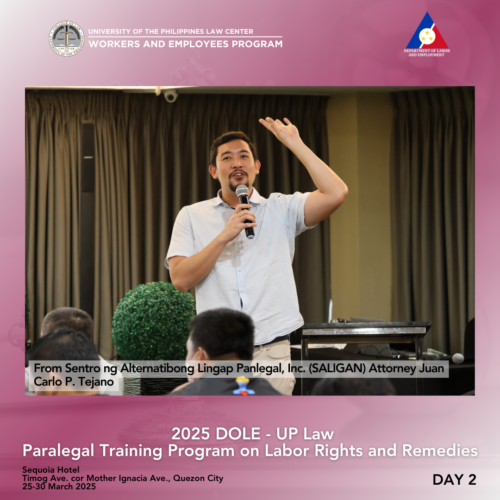
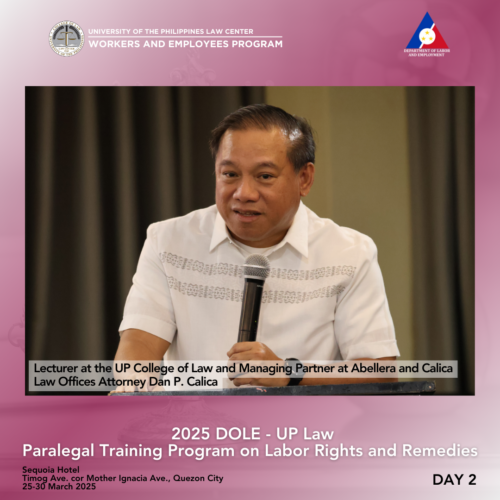
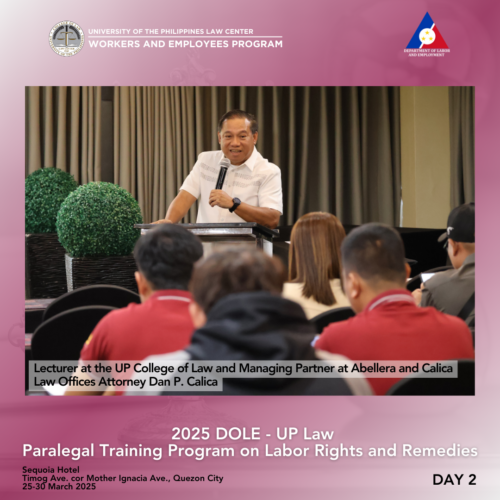
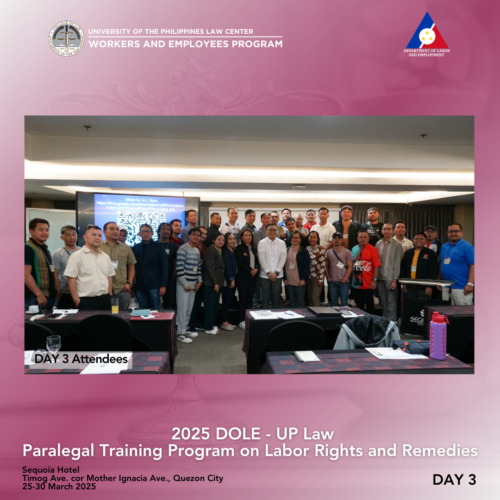
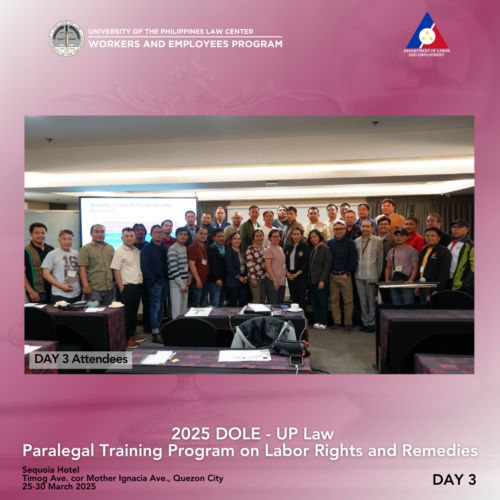
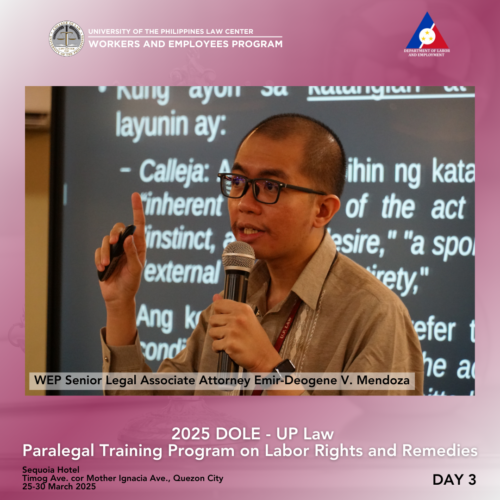
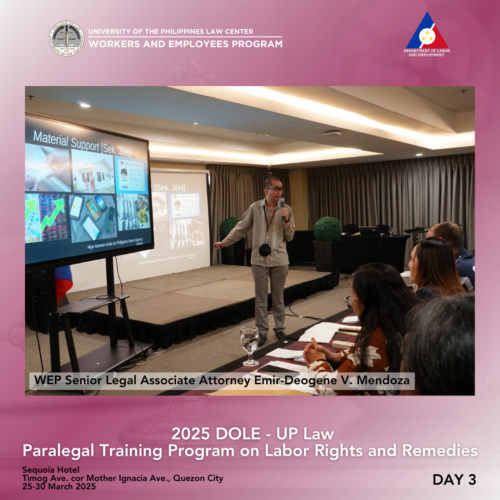
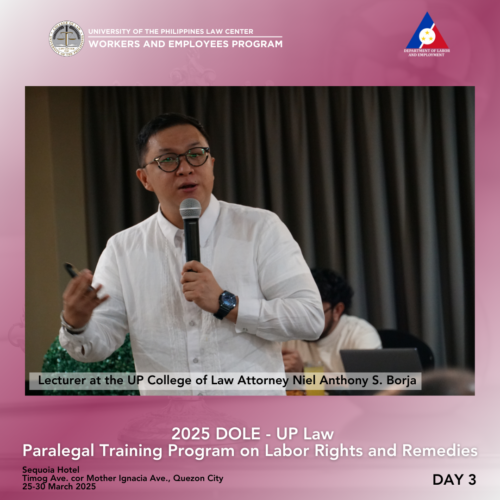
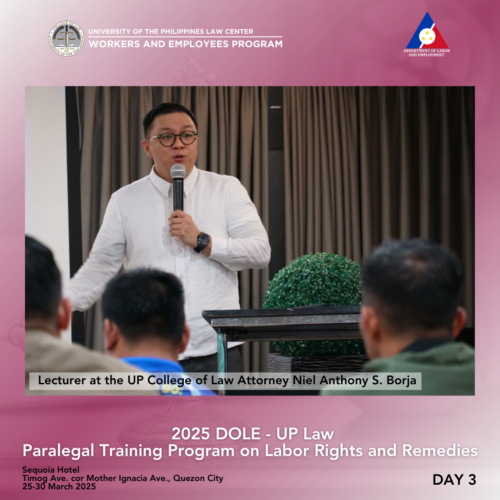
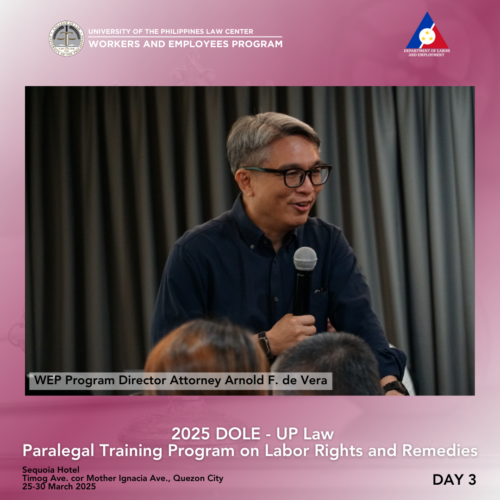
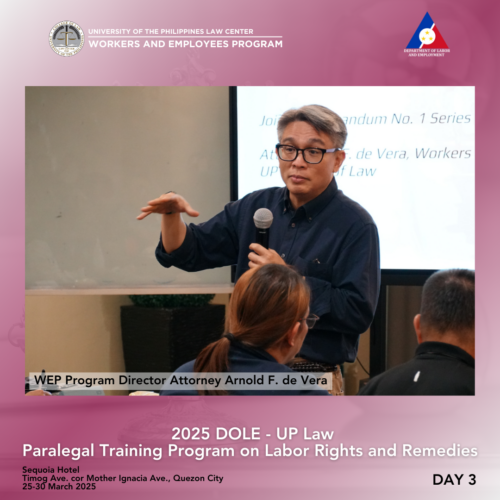
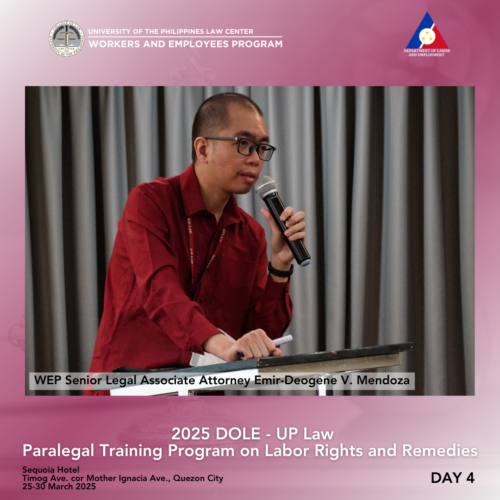
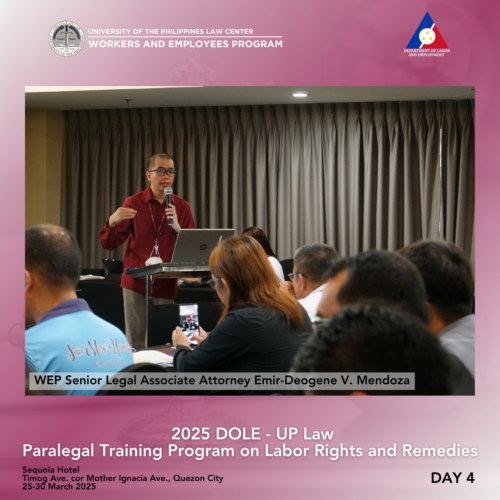
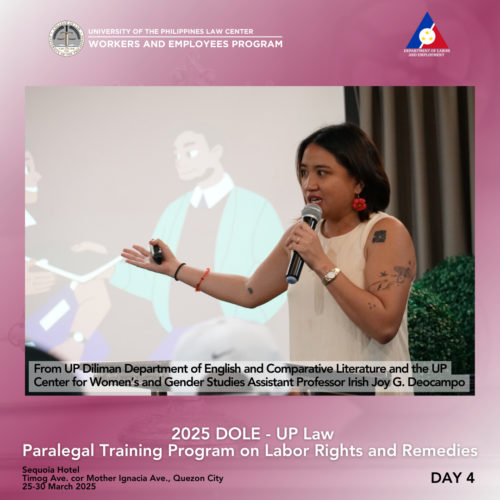
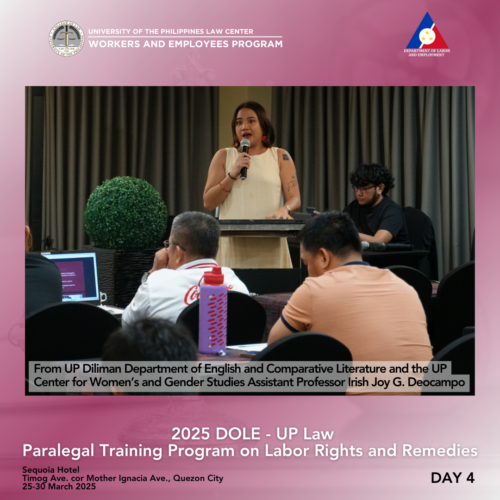
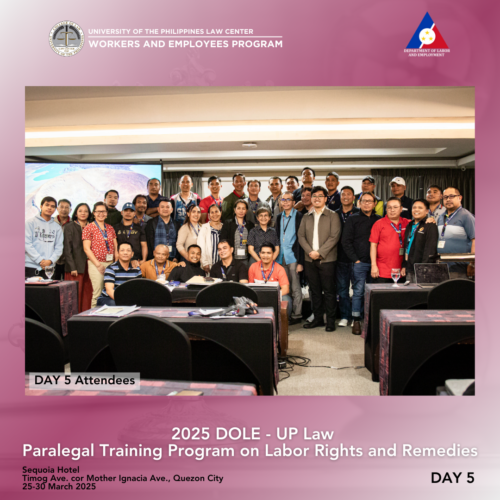
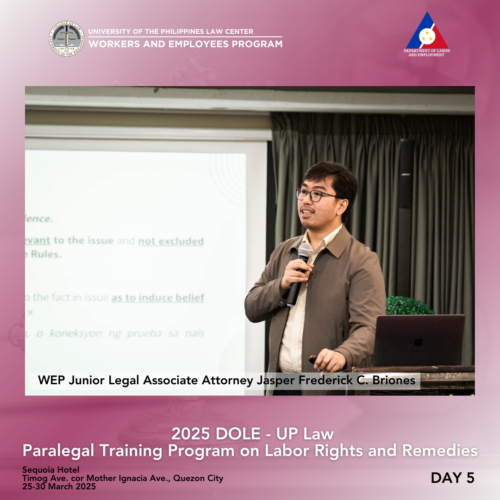
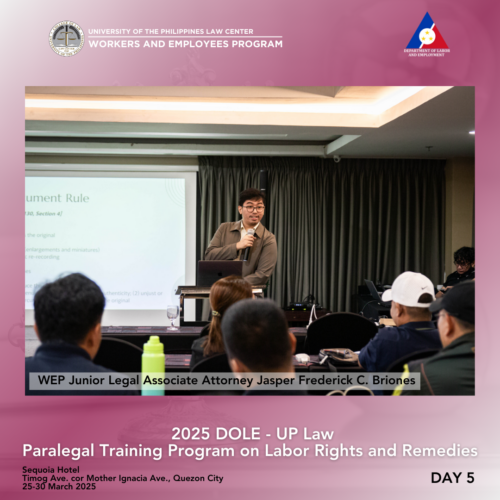
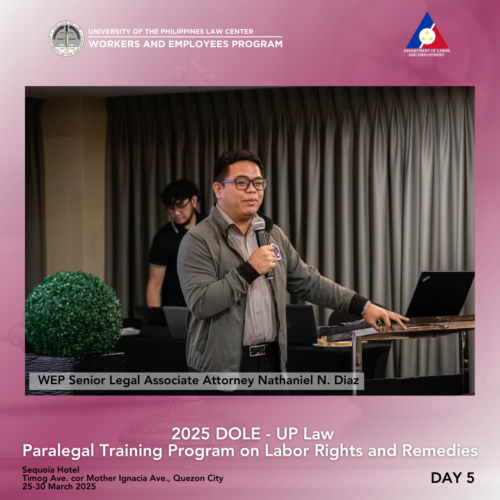
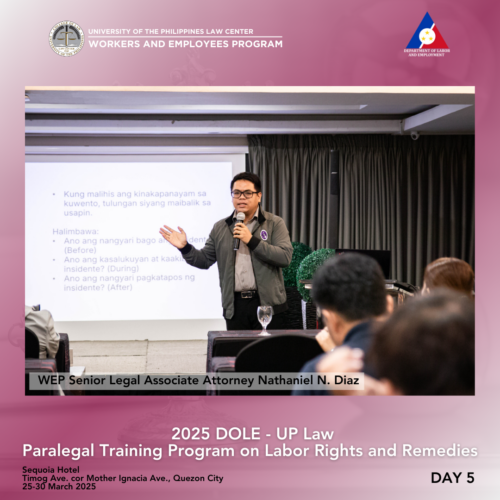
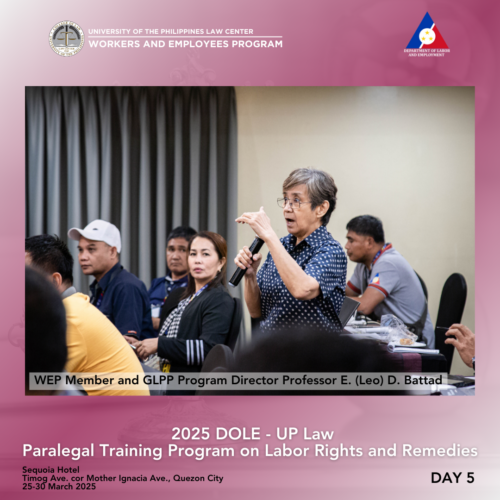
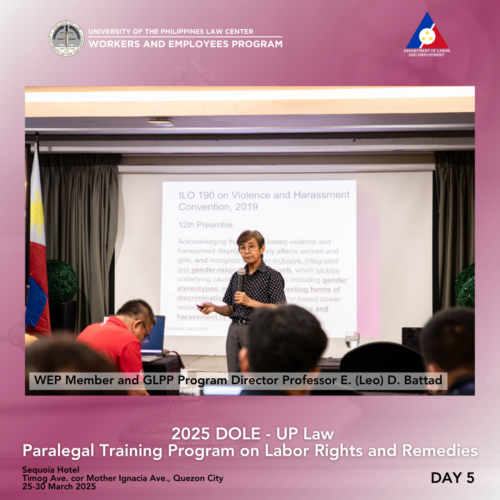
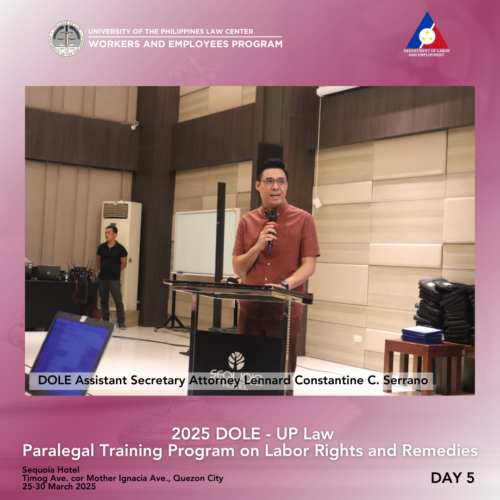
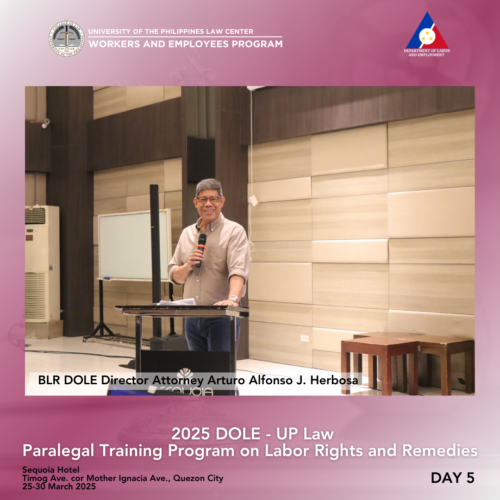
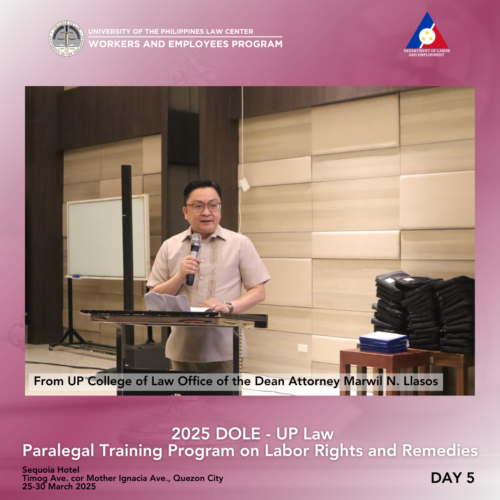
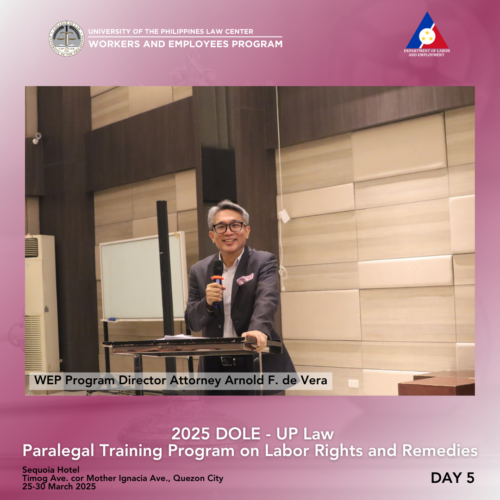
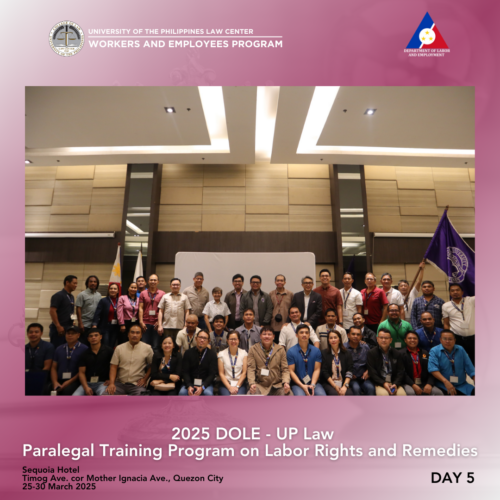
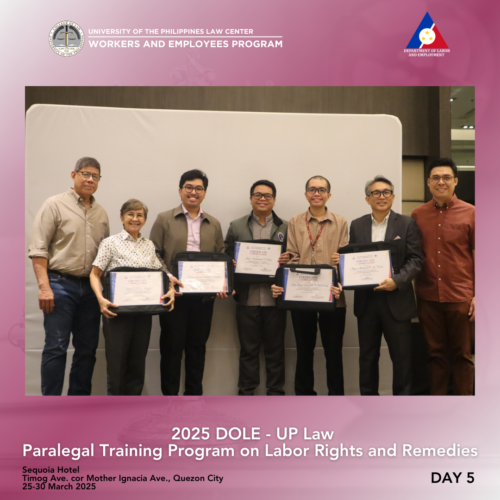
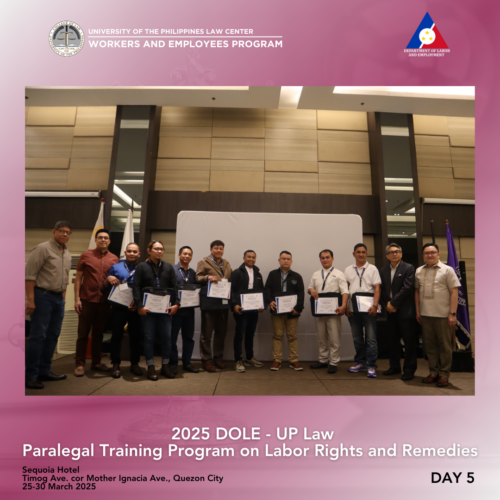
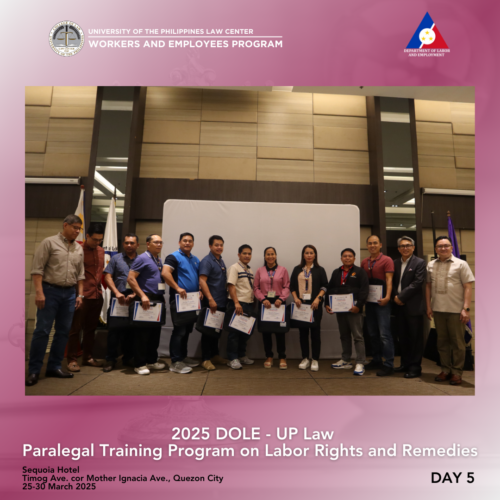
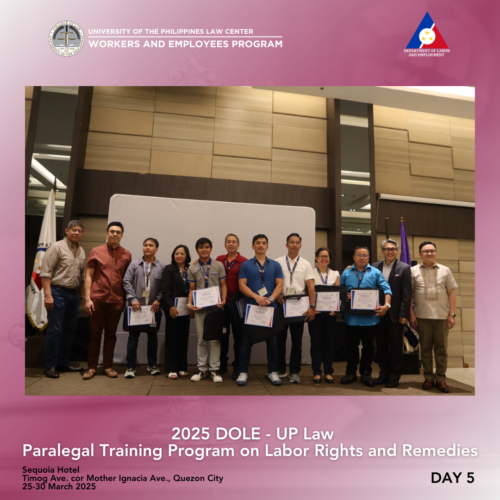
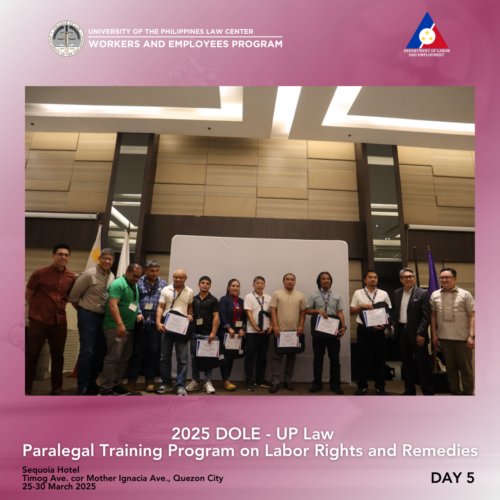






































































































 on the upper right corner to select a video.
on the upper right corner to select a video.